Solar Energy Storage: Do Solar Panels Store Energy?
Solar power has emerged as one of the most promising possibilities as the globe migrates toward sustainable energy sources. On the other hand, the sun does not constantly shine; when it does, the energy produced must be used quickly or wasted. This has prompted many people to wonder: do solar panels store energy? Is it possible to store solar energy?
Significant advances in solar energy storage technology have been made in recent years, allowing us to store excess solar electricity when the sun isn't shining. There are now numerous alternatives for storing solar energy, ranging from batteries to thermal storage systems.
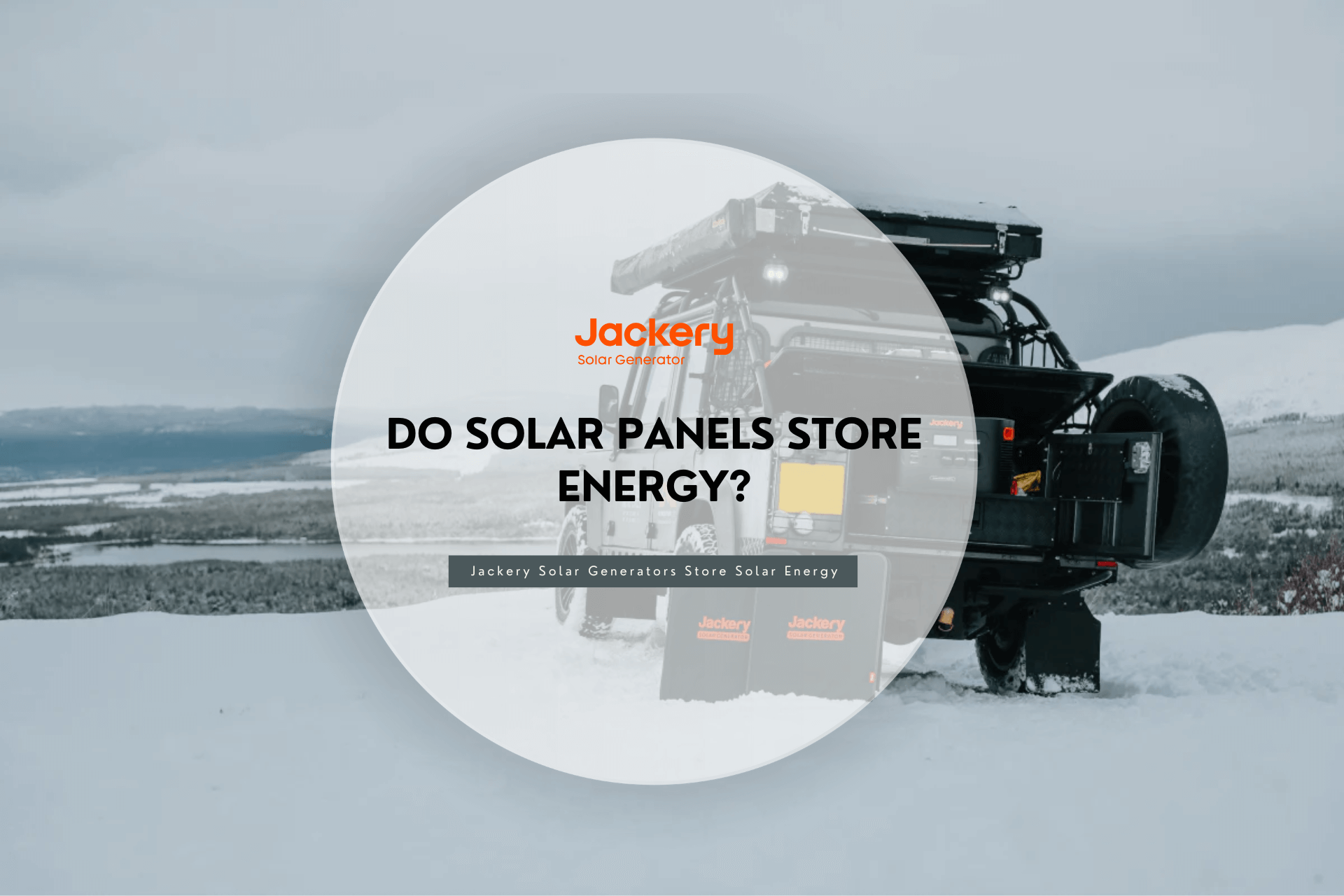
This page will answer the questions, "Do solar panels store energy?" and "How to store energy?" The solar battery or power station is essential for storing energy. Jackery Solar Generators combine solar panels with portable power stations to convert sunshine into electricity, allowing you to use them anywhere, anytime, at night, or in severe weather.
|
Products |
Images |
Capacity |
Rated / Peak Power |
Battery |
Size |
|
Solar Generator 3000 Pro |
 |
3024Wh |
3000W Rated, 6000W Peak |
Lithium-ion |
18.6x14.1x14.7in |
|
Solar Generator 2000 Plus |
 |
2-24 kWh |
3000W Rated, 6000W Peak |
LiFePo4 |
14.7x18.6x14.1in |
|
Solar Generator 1000 Plus |
 |
1.25-5 kWh |
2000W Rated, 4000W Peak |
LiFePo4 |
11.14x10.24x14in |
Do Solar Panels Store Energy?
No, solar panels do not store energy. Solar panels are one of the first things that come to mind when considering energy efficiency. Solar panels have been the leading choice for green energy for many years and have become synonymous with making good decisions for our world.
But they are still something that many people don't know much about, and as a result, they are something that many people have questions about - do solar panels store energy?
Sure, you know these panels generate energy from the sun's rays, but you probably didn't realize that solar panels cannot store energy. They are not the only components needed to generate solar power.
While this is crucial knowledge, you will only be aware of it if you have prior experience with solar panels. Most individuals are only aware of this fact when solar panels are installed in their homes or go on outdoor excursions. How is energy stored if solar panels cannot do so?
How to Store Solar Energy?
Most people prefer to store solar energy in a solar battery. Solar energy can be stored using thermal or mechanical methods such as molten salt energy storage technologies or pumped hydro systems. Still, these methods demand a lot of space, materials, and moving components. Overall, there are more practical methods of storing energy for a home.
On the other hand, solar batteries are an excellent solution to store household solar energy. Lithium-ion and LiFePo4 batteries are the most often utilized for solar energy storage. Lithium-ion batteries outlast other solar energy storage systems, such as lead-acid batteries, which require less maintenance and take up less space.

Lithium-ion batteries may store solar energy through a series of chemical reactions within the battery as lithium-ions flow through an electrolyte solution. As a result, when solar panels supply power to the battery storage system, a chemical process transports lithium-ions. It releases electrons in an electrolyte solution within the battery, allowing the energy to be stored.
When you need to consume electricity from the battery, electrons flow backward, and the battery is drained. This procedure can be done indefinitely, making the battery rechargeable.
How Do Solar Panels Work?
Solar panels consist of clusters of photovoltaic (PV) cells that undergo a reaction upon exposure to solar energy. Photons are the particles that carry the sun's energy to us. We won't get into specifics here, but each solar cell has charged silicon discs that generate electrons when they come into contact with sunlight.
Electrons are tiny subatomic particles with an electrical charge that we use to generate Direct Current (DC) power.
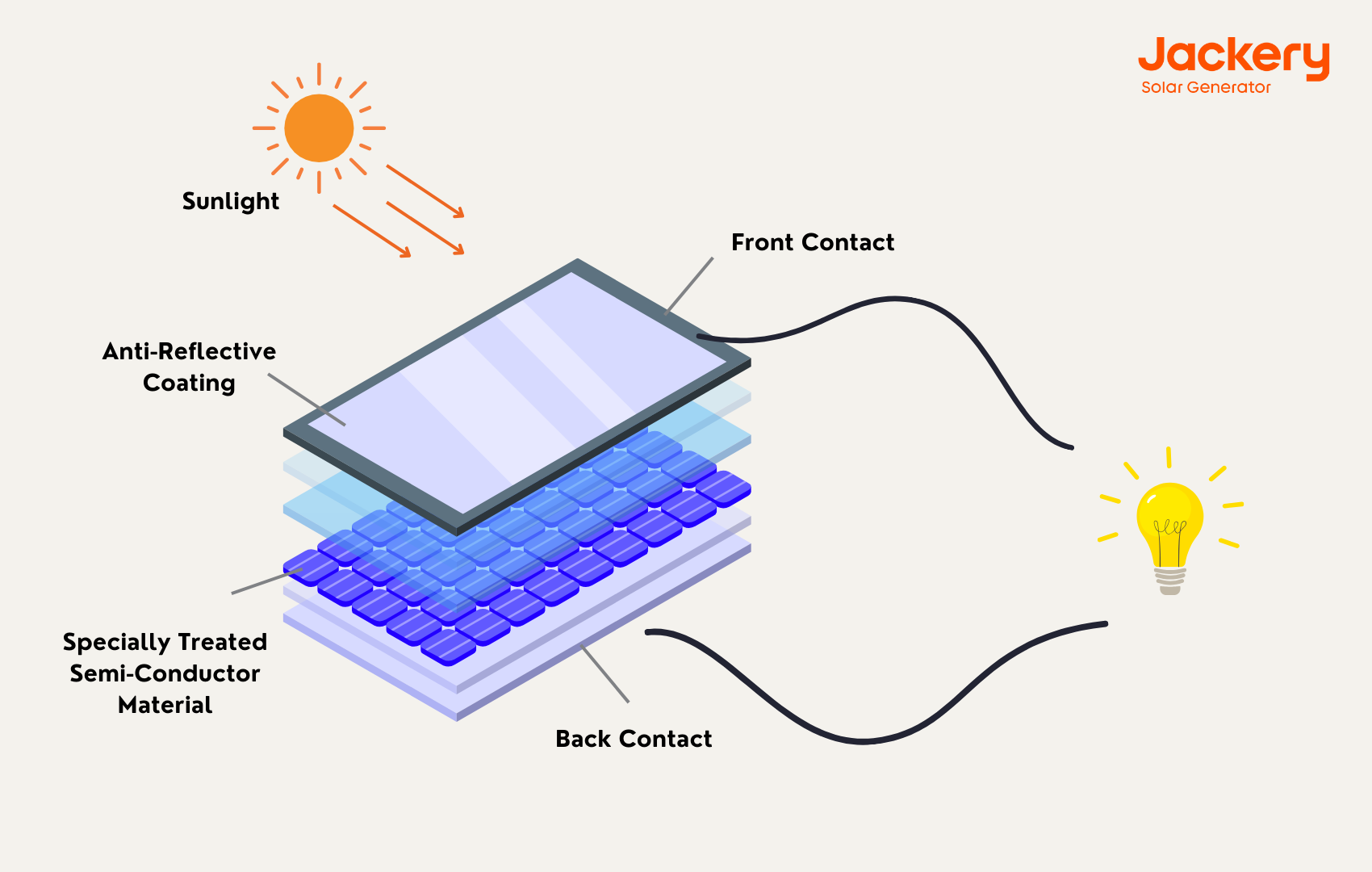
Solar panels only perform one thing. They can't hold onto electricity, and we can't connect anything to them. Solar panels are just a grouping of solar PV cells that provide the chemical process that transforms solar power into electrical energy.
How Do Solar Batteries Work?
Solar batteries store solar energy captured by solar panels and then release it as electricity through chemical reactions.
Solar panels can transform sunlight into direct current (DC) electricity, which is then directed through a charge controller and afterward stored in a battery. The charge controller regulates the electrical current between the solar panels and the battery, ensuring that the battery is not subjected to excessive charging or discharging.
Evaluating several solar energy storage methods is imperative when procuring a battery storage system for a solar array. The following are some of the most prevalent battery types:
Lithium-ion Battery: Lithium-ion batteries are a recent advancement in solar energy technology. They have a longer lifespan and are more efficient, but they are more expensive.
Lithium-iron-phosphate Battery (LiFePo4): Lithium-iron-phosphate batteries are the newest form of solar battery technology. They are the most expensive but have the most extended shelf life and can endure greater temperatures. These two varieties of lithium batteries are used in Jackery Portable Power Stations to provide improved efficiency, longer lifespan, and superior quality.
Lead-Acid Battery: This battery is the oldest and most used solar battery storage device type. It has the lowest initial cost, the most maintenance, and is less efficient. It is frequently utilized for solar-powered miniature houses.
However, solar batteries alone cannot power a solar system; an inverter (to convert DC to AC), a solar charge controller (in case of overcharge or over-voltage), and solar wiring are also required. When installing your solar system, which is time-consuming and complex, you must obtain the correct components. A solar generator, such as the Jackery Solar Generator, is ideal because it only takes 60 seconds to set up and has no moving parts or professional installation.
How Do Jackery Solar Generators Work?
Jackery is the leading manufacturer of high-quality solar equipment, particularly solar generators. Jackery Solar Generators comprise Jackery Solar Panels and Portable Power Stations that turn sunlight into power.
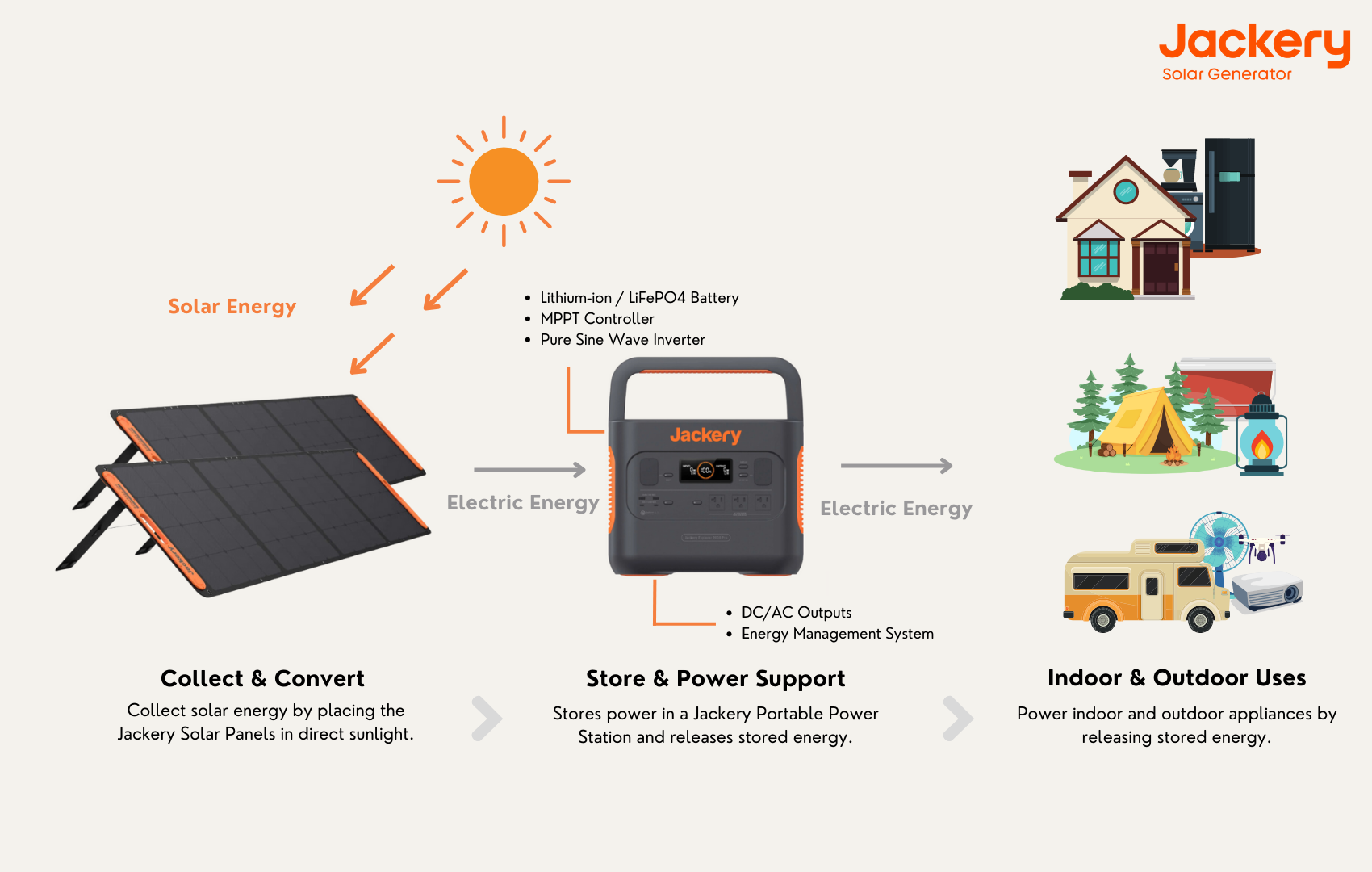
Connecting them using solar wires and connectors takes only 60 seconds. The monocrystalline solar cells capture and turn more sunlight into power. The pure sine wave inverter converts DC to AC to guarantee a constant power supply.
The Jackery Portable Power Station is a lithium-ion or LiFePO4 battery-powered inverter generator with DC and AC outputs and USB charging connections that can power most of your equipment, including your refrigerator, microwave, CPAP machine, and others. There is a renewable power source that will meet your needs, whether you are planning off-grid living, camping vacations, or home backup power supplies.
Furthermore, Explorer Portable Power Stations have a pass-through function that allows you to charge the power station and your appliances simultaneously.
How On-Grid & Off-Grid Solar Systems Store Energy?
There are two home solar systems, on-grid and off-grid, and each stores electricity differently.
Without an on-grid solar system, you don't have to store solar energy in your home. Your solar system connects to your local electrical grid after the inverter stage of the process, where electricity is transformed from DC to AC. Then you use your regular electricity as usual.
When you use more energy at home than your solar panels can generate, power will flow into your home from the grid. When the solar panels aren't working, an on-grid system will provide you with electricity.
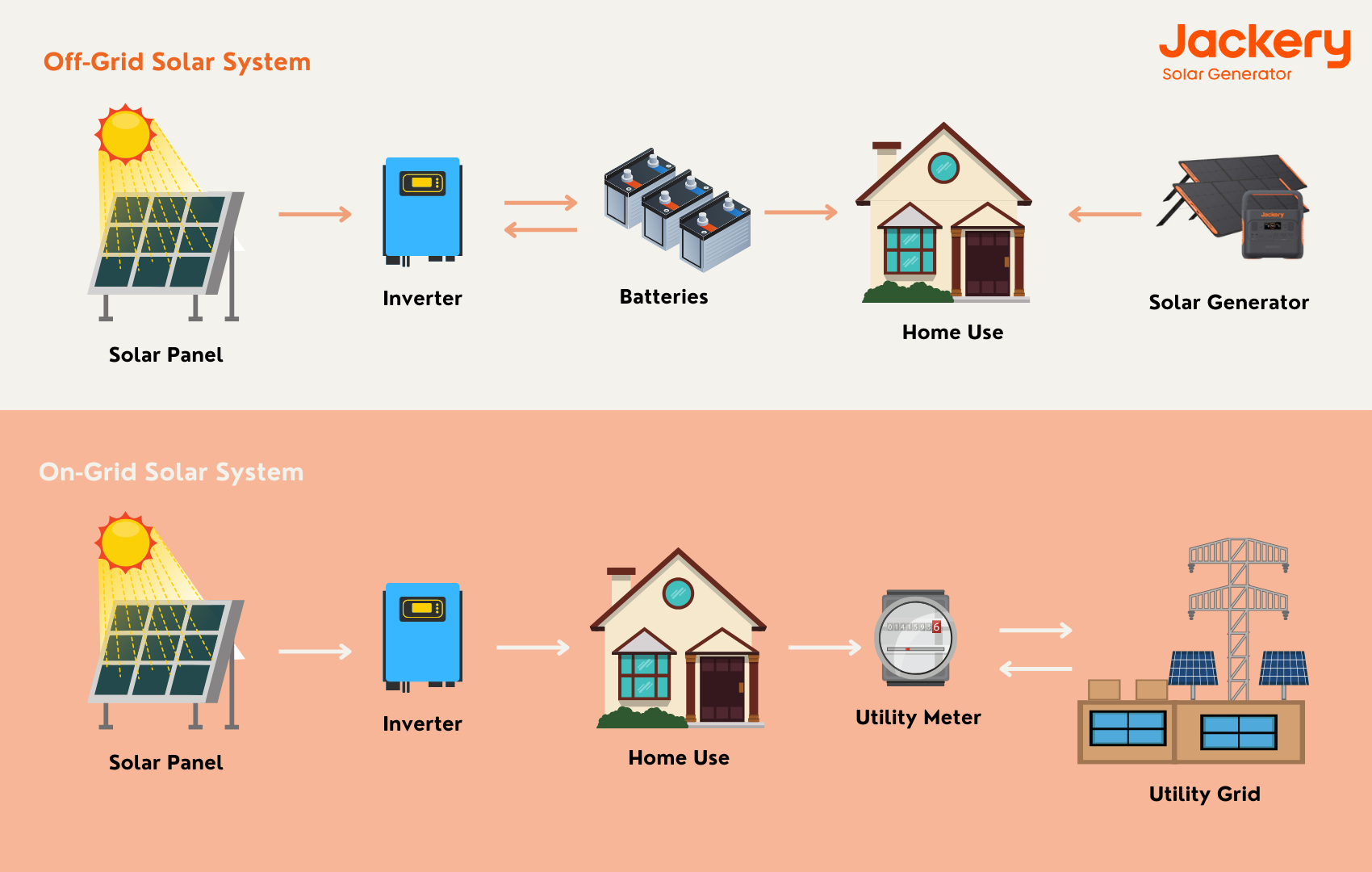
In contrast, if an off-grid solar system isn't connected to anything else, where does the electricity generated by your solar panels go? The solution is found in batteries. For example, a small off-grid solar system can be built by connecting some solar panels to a car battery, but it will not store enough energy to power a dwelling. You will require much larger batteries if you intend to use an off-grid solar system as your sole power source.
What Are The Benefits of Solar Energy Storage?
Storing this surplus energy is essential for optimizing the performance of any solar panel system. It can improve the efficiency of power networks, cut costs, and reduce emissions from fossil fuels. Several significant benefits can be gained from utilizing solar energy storage systems:
Consistent Energy Flow: Short-term solar energy storage enables steady electricity flow during minor generator interruptions, such as passing clouds or regular maintenance.
Power Independence: The energy grid is vulnerable to disruptions and outages caused by various factors ranging from wildfires to severe weather. Solar energy storage provides a safeguard against disruptive events by decentralizing the acquisition of energy.
Sustainability: By giving you more control over how much solar energy you use, battery storage can lower your property's carbon footprint in areas where utilities use fossil fuels. Large solar batteries can also charge electric vehicles and convert any household item into a "solar-powered" device.
Loads Balancing: If electricity is not stored, it must be consumed as soon as it is generated. Energy storage enables surplus energy to be saved for peak demand. Concerning renewable energy sources, such as the sun or the wind, storing excess power ensures that the lights continue to shine even when natural resources are depleted. Said energy storage enables an energy reservoir to be charged when generation is high, demand is low, and then released when age decreases and demand increases.
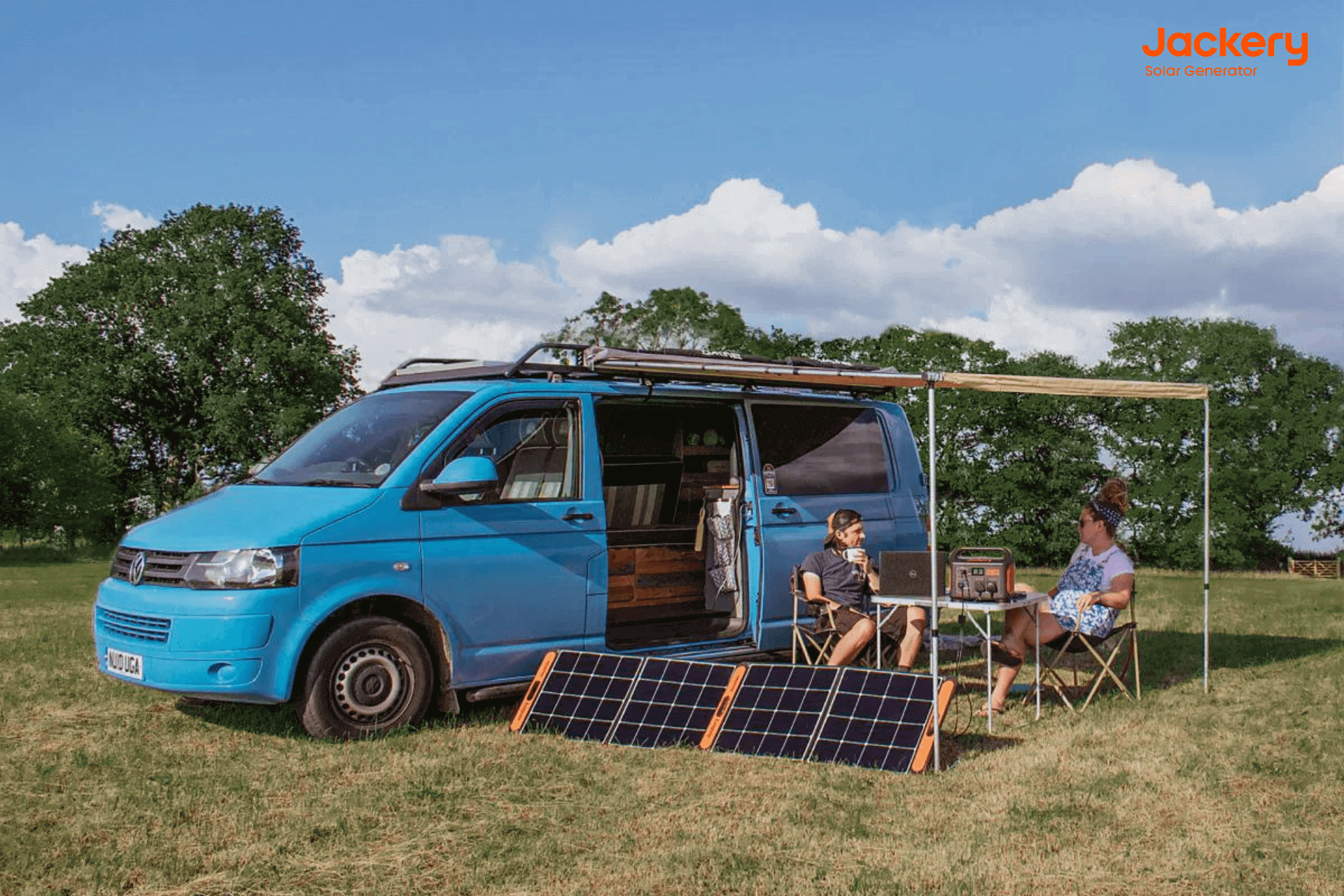
Reduced Electricity Bills: Battery storage can help you reduce your utility bills even as you increase your power consumption, primarily if you reside without solar net energy metering or with rules that do not fairly compensate you for the solar energy you generate. Any excess solar power generated and stored during the day can be discharged from a battery instead of utility consumption at night. However, you may not be compensated as much for excess energy supplied to the grid.
Backup Power Supply: Contrary to widespread assumption, solar panels won't keep your house running during a power outage. You must couple your solar system with a solar battery to keep your lights on when the power goes out. This is why energy storage is prevalent in locations like California, where power outages are expected.
How Much Does It Cost to Store Solar Energy?
Solar energy storage for your home will cost between $8,500 and $12,000.
Solar energy storage costs are falling year after year as battery technology improves and more people use it. However, this does not mean that solar storage is not expensive. Fortunately, some jurisdictions provide rebates and incentives expressly for solar energy storage.
The cost of solar energy storage is determined by the type of battery you select, the number of batteries you install, and the manufacturer. However, using a solar generator will gradually decrease your expenditures. For example, Jackery Solar Generators cost $400 to $4000, half the price of some sizeable residential energy storage systems.
Jackery Solar Generators for Better Solar Energy Storage
Having solar panels generate electricity for your home is a significant selling point. You're not only saving money, but you're also lowering your carbon footprint. However, without solar batteries to collect electricity, you must rely on the grid at night or on cloudy days. Jackery Solar Generators can be a backup power source to store solar energy for your home. They're also ideal for traveling, camping, RVing, or glamping.
Jackery Solar Generators have capacities ranging from 240Wh to 24 kWh, and you can choose one based on your needs; for example, if you want to use it as a backup power source for your home, you can consider the greater capacities and the lesser capacities for outdoor use. Alternatively, you can use the following calculation to determine working hours while utilizing Jackery Solar Generators:
Working Time (Hours) = Power Station Capacity (Wh)* 0.85 / Appliance Wattage (W)
Solar Generator 3000 Pro, for example, can charge a 60W TV for 40.3 hours (3024*0.85/60). Using this method, you can determine how big of a solar generator you need based on your electricity use.
Jackery Solar Generator 3000 Pro
The Jackery Solar Generator 3000 Pro has a charging efficiency of 99% and can charge a wide range of appliances for an extended period. It also has APP control capability, making it an excellent power supply alternative for recreational vehicles (RVs), camping vacations, off-grid living, and household situations.

The Explorer 3000 Pro power station has a large capacity of 3024Wh and a powerful output of 3000 watts. This amount of energy is adequate for both indoor and outdoor applications. For example, it can power an 800W kettle for 3 hours and a 550W coffee maker for around 4.4 hours.
MPPT technology and a pure sine wave inverter ensure 99% solar charging efficiency. A wall charge takes 2.4 hours, including the charging procedure from 0% to 100% battery capacity. Solar charging, on the other hand, takes 6 to 7.5 hours when using 6* SolarSaga 100W solar panels. The inclusion of car charging infrastructure alleviates concerns about power outages.
The power station may be controlled via Wi-Fi or Bluetooth, increasing its adaptability for both indoor and outdoor use. Mobile devices that offer information such as the remaining battery level, time, output, input, and other pertinent data can be used to monitor the operating state of the power station.
|
Product |
Solar Generator 3000 Pro |
|
Capacity |
3024Wh |
|
Battery |
Lithium-ion |
|
Life Cycles |
2000 cycles to 70%+ capacity |
|
Dimensions |
18.6x14.1x14.7in |
|
Using Temperature |
-20~40℃ (-4~104℉) |
|
Recharging |
Solar Charging (6*SolarSaga 100W): 7.5H AC Adapter: 2.4H 12V Car Adapter: 35H |
|
Output Ports |
1*AC Output: 120V~ 60Hz 25A Max; 3*AC Output: 120V~ 60Hz 20A Max; 3*USB-C: 100W Max, 5V⎓3A, 9V⎓3A, 12V⎓3A, 15V⎓3A, 20V⎓5A; 1*Carport: 12V,10A Max |
|
Working Hours |
Portable AC(1150W): 2.1H Electric Oven(1000W): 2.4H Kettle(800W): 3H Coffee Maker(550W): 4.4H TV(60W): 40.3H CPAP Machine(30-60W): 40.3-80.6H |
Jackery Solar Generator 2000 Plus
The Solar Generator 2000 Plus has an adjustable 2 kWh - 24 kWh capacity. Adding a battery pack and solar panels may reach a massive 24 kWh capacity. It is ideal for off-grid living and powering you during power outages. A total solar charge takes an incredible 2 hours - power has become fully autonomous, charging using solar energy.

A single Jackery Explorer 2000 Plus Power Station can accommodate up to 5 add-on battery packs at once, increasing capacity from 2 kWh to an impressive 12 kWh, making it ideal for road trips, outdoor camping, heavy-duty, and domestic emergencies. 2* Jackery Explorer 2000 Plus Portable Power Stations can be connected in parallel, increasing capacity to a massive 24 kWh, excellent for powering up to 99% of devices and providing peace of mind during power outages.
With 6* SolarSaga 200W solar panels, the Solar Generator 2000 Plus can be fully charged in approximately 2 hours. The power source becomes self-sufficient, charging with solar energy rather than the power grid. The advanced LiFePO4 battery ensures a 10-year lifespan - even if used only once daily.
|
Product |
Solar Generator 2000 Plus |
|
Capacity |
2-24 kWh |
|
Battery |
LiFePO4 |
|
Life Cycles |
4000 cycles to 70%+ capacity |
|
Dimensions |
14.7x18.6x14.1in |
|
Using Temperature |
Charge Temperature:0~45°C (32~113°F) Discharge Temperature:-10~45°C (14~113°F) |
|
Recharging |
Solar Charging (6*SolarSaga 200W): 2H AC Adapter: 2H 12V Car Adapter: 25H |
|
Output Ports |
5*AC Output: 120V~ 60Hz, 20A Max, AC Output(×1):120V~ 60Hz, 25A Max, AC Total Output,3000W Max, 6000W surge peak; 3*USB-A: Quick Charge 3.0, 18W Max; 2*USB-C: 100W Max, (5V, 9V, 12V, 15V, 20V up to 5A); 1*Carport: 12V⎓10A |
|
Working Hours |
Portable AC(1150W): 1.4H Electric Oven(1000W): 1.6H Kettle(800W): 2H Coffee Maker(550W): 3H TV(60W): 27.2H CPAP Machine(30-60W): 27.2-54.5H |
Jackery Solar Generator 1000 Plus
Due to its unrivaled output, the Jackery Solar Generator 1000 Plus is the best alternative for similar-level portable power stations. It assists with camping, off-road driving, home emergencies, and other eventualities. It's the all-in-one solar generator to fuel your life because it's versatile and expandable in capacity.

Supports up to three add-on battery packs, increasing the capacity to 5kWh and providing 1-3 days of home backup power. While camping, enjoy the freedom of nature. Keep your phone, projector, and speakers powered in the great outdoors with the comfort and convenience of a solar generator. Stay connected and keep essential gadgets running with reliable backup power, ensuring safety and convenience in critical situations.
The Jackery Explorer 1000 Plus, with a 10-year lifespan and a Lithium Iron Phosphate (LiFePO4) battery, provides a constant voltage and pure sine wave, ensuring the safety of all your electrical appliances. In addition, the revolutionary ChargeShield technology and consistent power supply protect against any equipment damage.
|
Product |
Solar Generator 1000 Plus |
|
Capacity |
1.5-5 kWh |
|
Battery |
LiFePO4 |
|
Life Cycles |
18.6x14.1x14.7in |
|
Dimensions |
1.5-5 kWh |
|
Using Temperature |
-20~40℃ (-4~104℉) |
|
Recharging |
Solar Charging (6*SolarSaga 100W): 7.5H AC Adapter: 2.4H 12V Car Adapter: 35H |
|
Output Ports |
1*AC Output: 120V~ 60Hz 25A Max; 3*AC Output: 120V~ 60Hz 20A Max; 3*USB-C: 100W Max, 5V⎓3A, 9V⎓3A, 12V⎓3A, 15V⎓3A, 20V⎓5A; 1*Carport: 12V,10A Max |
|
Working Hours |
Portable AC(1150W): 2.1H Electric Oven(1000W): 2.4H Kettle(800W): 3H Coffee Maker(550W): 4.4H TV(60W): 40.3H CPAP Machine(30-60W): 40.3-80.6H |
Do Solar Panels Work in Bad Weather? Or Night?
Solar panels are significantly more environmentally friendly, so you are helping the earth if you utilize them. Similarly, solar panels enable you to be more self-sufficient.
However, one crucial problem concerning solar panels is the weather. Solar panels are powered by sunlight, so if you live in a location prone to inclement weather, you may be hesitant to install them in your home. So, do solar panels function in inclement weather?
No, solar panels cannot work in bad weather when sunlight is not available and even at night. However, these gadgets only function correctly when the weather is good. In reality, adverse weather conditions drastically reduce the effectiveness of solar panels.
Solar panels are effective at generating energy on a sunny day. However, on cloudy days, the performance of solar panels might be deplorable. In fact, on damp and overcast days, you may only be able to generate 10-25% of the energy that you could on a sunny day.
However, solar batteries or power stations will store sufficient solar energy. Jackery Solar Generators have a longer lifespan and higher operational efficiency, allowing them to operate in bad weather or even at night.
Is Solar Energy Storage Worth It?
Solar battery storage will be worthwhile if you live in an area with regular power outages or your utility uses Time-of-Use charges. Otherwise, solar batteries are still prohibitively expensive for the majority of homeowners.
While there are numerous advantages to using solar batteries, you must examine whether those advantages outweigh the price. We mean that solar energy storage is a luxury rather than a necessity. While solar energy storage may not result in further savings, solar panels almost surely will. Solar panels are now more low-cost than ever before and will help you save money on power bills. Alternatively, consider purchasing a Jackery Solar Generator to harness solar energy and power most indoor and outdoor appliances with limited budgets.
Disclaimer:
The runtime mentioned for appliances powered by Jackery is for reference only. Actual runtime may vary under different conditions. Please refer to real-world performance for accurate results.






































































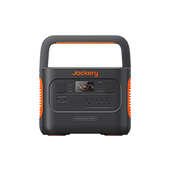





































Leave a comment